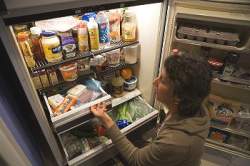
40 percent of food waste occurs in the home and 93 percent of people admit throwing away food they never cooked.
The average family spends $175 per week on groceries. If they waste just 25% of the food they buy, that's $43.75 per week or $2275 per year directly into the garbage.
We throw away perfectly good food, or make good food bad through neglect. That beautiful head of lettuce that you paid $3.00 for has brown edges two days later, and you just can't serve brown edged lettuce, so in the garbage it goes.
Today, I'm going to help your food budget and stop this tremendous amount of wasted food with some simple tips for saving money on your groceries. I'm not going to tell you to clip more coupons, that takes up more time, and coupons are marketing tools. They're designed to get you to buy something you might not, or buy two when you only need one.
My tips are from the perspective of the food. And, it's not to tell you just to buy cheaper food. Nobody wants to feed their family canned spaghetti every night as a solution to their growing food budget. Cheaper food isn't the answer either.
Most advice on saving money at the grocery store will focus on what to do before you get there, like reviewing the sales flyer or organizing your coupons. Or, they focus on what to do once you're in the grocery store.
You have the greatest effect on your food budget after you get the food home. My focus is on how you treat your food after you've purchased it. This is where the greatest potential for over-cooking, or not cooking what you bought until it goes bad. I concentrate on how to reduce the tremendous amount of wasted food that passes through the grocery check out directly into your garbage because:
- You didn't know how to cook the item so it went bad.
- You only know one way to cook the item and you're sick of that.
- You cooked too much and eventually waste the leftovers.
- You cooked it the wrong way leading to disappointing results.
- It went bad before you got a chance to cook it.
- Shop with a weekly menu plan in place. Buy only what you plan to cook. Resist impulse purchases that will languish in your cupboard or freezer until you find a recipe or an inspiration for the ingredient. You needn't stock up for war-time, the store is close-by.
- Cook the item correctly to avoid disappointment. When you pick up an item at the farmers market or grocery store, look at it as if it's already cooked. What type of dish will you create? How will you cook the item? What will you serve it with? Is there anything currently in your pantry that can be used as a side dish?
- Store foods correctly when you get them home. Leafy vegetables need to breathe and are suffocated by plastic bags. Potato starch turns to sugars in the refrigerator. Potatoes should be stored at room temperature. Protect your investment in food by not destroying its nutritional value, flavor and appearance with poor storage.
- Editor's Note: Chef Todd Mohr is a classically trained chef, educator and food-scrutinizer. He has made it a personal mission to help you save on food with a FREE full-length video that reveals his 7 best ways to cut your food budget and save up to $2275 this year!
